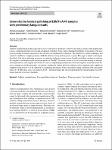Item Infomation
Full metadata record
| DC Field | Value | Language |
|---|---|---|
| dc.contributor.author | Annalisa, Acquesta | - |
| dc.contributor.author | Tullio, Monetta | - |
| dc.contributor.author | Stefania, Franchitti | - |
| dc.date.accessioned | 2023-04-18T04:16:37Z | - |
| dc.date.available | 2023-04-18T04:16:37Z | - |
| dc.date.issued | 2023 | - |
| dc.identifier.uri | https://link.springer.com/article/10.1007/s00170-023-11400-6 | - |
| dc.identifier.uri | https://dlib.phenikaa-uni.edu.vn/handle/PNK/8032 | - |
| dc.description | CC BY | vi |
| dc.description.abstract | Additive manufacturing technologies have several well-known advantages; however, the surface quality of the printed parts is poor, compromising the corrosion and mechanical properties. Thus, surface finishing treatments are necessary. The most post-processing treatments proposed in the literature are mechanical or chemical. The formers are contact techniques and cannot be suitable for complex geometry, while the latter use strong and dangerous reagents. This paper is aimed to investigate the effect of the electropolishing treatment, a contactless technique, using an eco-friendly electrolytic solution in reducing the roughness and improving the fatigue properties of Ti6Al4V specimens produced by electron beam melting technology. Several parameters affecting the effectiveness of the electropolishing treatment have been investigated, as interelectrode distance, stirring rate and duration time. An optimal combination of them allowed a uniform surface treatment and a significant roughness reduction (64% of Sa reduction for cylindrical specimens). | vi |
| dc.language.iso | en | vi |
| dc.publisher | Springer | vi |
| dc.subject | Ti6Al4V | vi |
| dc.title | Green electrochemical polishing of EBM Ti6Al4V samples with preliminary fatigue results | vi |
| dc.type | Book | vi |
| Appears in Collections | ||
| OER - Kỹ thuật điện; Điện tử - Viễn thông | ||
Files in This Item:

